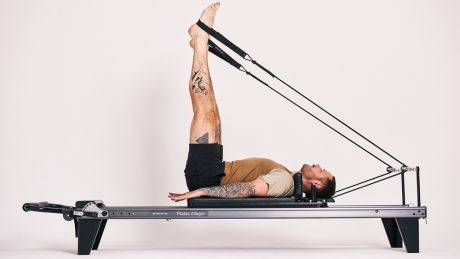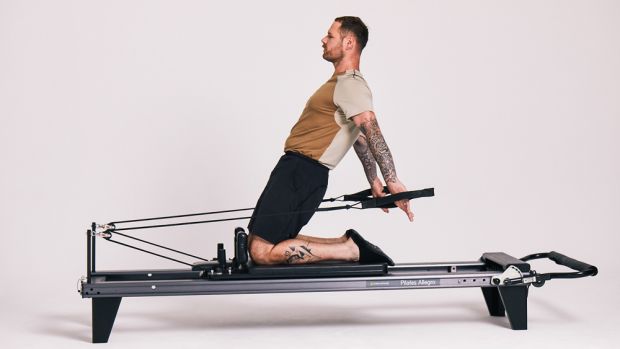What Is Reformer Pilates?
It’s Pilates on a terrifying rack and it’s something you should definitely try. We know because we did

For the uninitiated, reformer Pilates can seem really quite intimidating. For one, the reformer has both the appearance and the name of a torture device, and for two – well actually you only need that one right? The reformer. Sends a shiver down the spine. There’s probably one in the corner of Room 101.
Here’s one way to make it seem it less intimidating.
“Reformer is basically a big Theraband,” says James Shaw, Pilates trainer at Frame studios.
There we go. You’re not scared of a Theraband are you? Here are more reassuring words from Shaw on reformer Pilates.
What is reformer Pilates?
“The reformer is a piece of equipment created by Joseph Pilates,” says Shaw. “It’s basically a workout using spring resistance. What it teaches you is how to find length and space in the body while working against resistance.”

What are the benefits?
Like Pilates performed on a mat, the reformer helps to strengthen your core, improve your posture and increase your mobility.
“Reformer Pilates complements any training regime,” says Shaw. “This morning I’ve trained two swimmers and a tennis player. Everybody needs that stronger centre, whether you’re a high-level athlete or working at a desk. Sitting all day at work with minimal movement often leads to back pain. Pilates alleviates it, because it gives you the length and space through the body, which gives you better posture and better awareness of your body.”
Get the Coach Newsletter
Sign up for workout ideas, training advice, reviews of the latest gear and more.
Reformer Pilates is also something you can use to reduce your risk of injuries, rather than just something that can help with rehab.
"All too often we see people just because they’re injured,” says Shaw. “Incorporate this into your workout routine now and it arms you with a skill, as opposed to having to find the skill after you hurt yourself.”
How does it differ from mat Pilates?
Reformer Pilates works the body in the same way as mat Pilates, and the reformer is not the only piece of equipment used in the practice. The various pieces of equipment used, as well as mat Pilates techniques, complement each other to help you progress.
“It’s a full system,” says Shaw. “You’re using equipment to build the skills to make your mat practice better. With reformer we work with spring resistance to help your body recognise how to find space. Then when you take the spring off, and you do a similar mat move, you can find the same space in the body without that resistance.”
What’s the best way for beginners to get started?
This is not one to go and try by yourself. Beginners should either find a suitable class or opt for a one-on-one session.
"It depends on the individual,” says Shaw. “Many years ago when I started I did two one-to-ones first, and then I went to class, but some people don’t want to have a one-to-one because they don’t want to be put underneath that microscope. Either way works.”
Shaw was also keen to stress that everyone is a little confused by the reformer when they start, and that you shouldn’t worry about it.
“You’re intimidated by this mean piece of equipment – you don’t know where your arms and legs are going – and then you’ve got to deal with all this Pilates jargon, this choreography,” says Shaw. ”When you’re a beginner you‘ve got to give it a chance. Nobody is good at it before they start!”
How hard is it?
To get a proper taste of reformer Pilates we tried one of Shaw’s classes at Frame Shoreditch. It’s definitely a little daunting at first, just because we had no idea how to do little things like attach different springs on the reformer or even adjust the headrest. However, once you get into the swing of things the focus quickly moves on to your own body, as you try to work the right muscles with each move.
Once the class got going we actually found it easier to get into the right positions than we’ve done previously in mat Pilates classes, because working against the springs makes finding the positions simpler at times. Shaw also gave plenty of helpful advice on what to do without constantly correcting us, which is exactly what you want from an instructor.
The class was challenging in the way any Pilates class is – you start with what seems a simple movement or hold, and then as you repeat or prolong it, the challenge just grows until your core is shaking. If you’re someone who spends a lot of time hunched over a desk, or a keen sportsperson looking to support your training, the benefits of using the reformer will be obvious as soon as you try a class.

Nick Harris-Fry is a journalist who has been covering health and fitness since 2015. Nick is an avid runner, covering 70-110km a week, which gives him ample opportunity to test a wide range of running shoes and running gear. He is also the chief tester for fitness trackers and running watches, treadmills and exercise bikes, and workout headphones.
